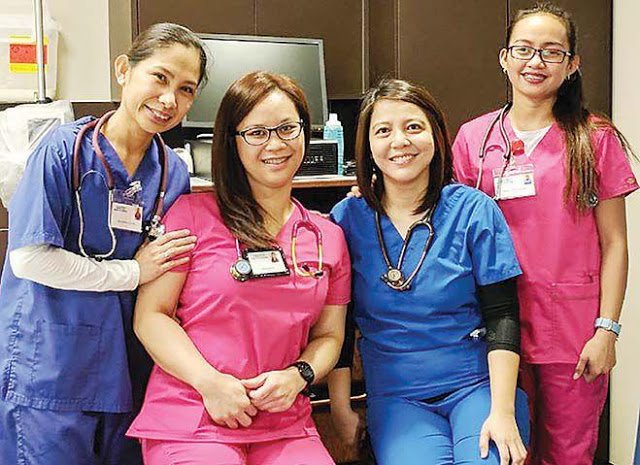
Filipino American medical workers have suffered some of the most staggering losses in the coronavirus pandemic. As International Nurses Week launched this week with platitudes of gratitude in the midst of AAPI Heritage Month, it’s time America recognizes the Filipino Americans’ heroic role in caring for the ill, infirmed and elderly.
The number of deaths among Filipino American nurses and other healthcare workers is most likely vastly undercounted.
In the New York-New Jersey region alone, ProPublica learned of at least 30 deaths of Filipino health care workers since the end of March and many more deaths in those peoples’ extended families. The virus has struck hardest where a huge concentration of the community lives and works. They are at “the epicenter of the epicenter,” said Bernadette Ellorin, a community organizer.
Nearly a quarter of adults with Filipino ancestry work in hospitals or other medical fields in the NY-New Jersey region, a ProPublica analysis of 2017 U.S. census data found.
A 2018 survey of Filipino nurses by the Philippine Nurses Association of America found that a large proportion of respondents were concentrated in bedside and critical care — “the opposite of social distancing,” executive director Leo-Felix Jurado told ProPublica, making them particularly vulnerable to contracting the coronavirus.
It will take someone with better resources than Views From the Edge to determine the true impact the coronavirus has had on the healthcare workers of Filipino descent.
Who knows how many of the staff members of the nursing homes or homes for the elderly were Filipino? These businesses are reluctant to name their workers, much less identify them by ethnicity.
Posts below by Views From the Edge tell some of their stories but barely scratch the surface of the toll taken on Filipino American healthcare workers, most of whom are nurses.
- 9 of 23 New York nurses that died from coronavirus were AAPI; 7 were Filipino American RNs.
- Kansas City nurse dies one week short of retirement
- Nurses in Detroit and a prison facility fall to coronavirus
- Howard University veteran nurse taken by the pandemic
- Veteran nurse in Florida falls to COVID-19
- Illinois RN and New Jersey nurse among family members who perish
To protect patient privacy, most hospitals and healthcare facilities are reluctant to reveal the race of staff members who died from Covid-19. That makes it difficult to ascertain all the deaths of Filipino American workers. It also hides the great dependency that the American health system has on foreign medical graduates, especially nurses from the Philippines.
Why are there so many Filipino nurses in the US?
“One untended legacy of the half-century the Philippines was a US colony. 1898-1946 (saw) the creation of hundreds of American-style nursing schools that eventually produced tens of thousands of caregivers a year, making the country “the leading exporter of nurses in the world,” Catherine Ceniza Choy told ProPublica. Choy is a professor of ethnic studies at the University of California, Berkeley, and author of “Empire of Care: Nursing and Migration in Filipino American History.
Certainly, at this unprecedentied time in history, whether or not it was exploitation or an opportunity for Filipinos, there is an abundance of well-trained Filipino nurses willing to leave the Philippines and the comfort of family, making them in demand the world over, not only in the US and Canada, but Australia, Germany, Japan and the Middle East.

Even if they get placed in low-paying positions, the pay they receive is greater than what they would earn in the Philippines, allowing them to send money back home for their relatives. Perhaps this Filipino value — opportunity to help the family — is worth the loss of familiarity and comfort of their barrio or family.
The value of kapwa, a Filipino attribute contributes heavily to the international reputation of Filipinos as caregivers: nanny’s, teachers, eldercare companions and nurses.
“Kapwa is a recognition of a shared identity, an inner self, shared with others. This Filipino linguistic unity of the self and the other is unique and unlike in most modern languages. Why? Because implied in such inclusiveness is the moral obligation to treat one another as equal fellow human beings. If we can do this – even starting in our own family or our circle of friends – we are on the way to practice peace. We are Kapwa People,” says Professor Virgilio Enriquez, founder of Sikolohiyang Pilipino.
Sometimes described as “self-sacrifice,” it contributes to the willingness of the nurses to put the patient before one’s self, which sometimes put the Filipino nurses in conflict with American values and hospital rules of patient care.
“They have such a profound willingness to work that they would forget their own well-being,” says Choy to ProPublica. Kapwa.
“They would think of their loved ones in the Philippines — if they don’t work, then they can’t send money back home.” Kapwa.
Filipino nurses have what it takes to survive the worst scenarios such as COVID-19, says Patrick Singson, a n ER nurse working in New York City.
“Filipinos are fighters. We don’t give up. We don’t complain. Others would have already quit. But Filipinos, we’re solid,” he says. Kapwa.
AsAmNews has Asian America in its heart. We’re an all-volunteer effort of dedicated staff and interns. Check out our new Instagram account. Go to our Twitter feed and Facebook page for more content. Please consider interning, joining our staff, or submitting a story.
